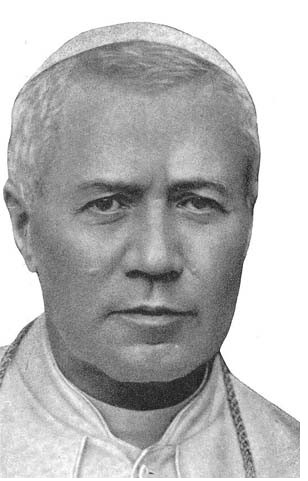ST. PIUS X
On the Teaching of Christian Doctrine
Excerpts from the Encylical: ACERBO NIMIS
 .
. . How many and how grave are the consequences of ignorance in matters of
religion! And on the other hand, how necessary and how beneficial is
religious instruction! It is indeed vain to expect the fulfillment of the
duties of a Christian by one who does not even know them. .
. . How many and how grave are the consequences of ignorance in matters of
religion! And on the other hand, how necessary and how beneficial is
religious instruction! It is indeed vain to expect the fulfillment of the
duties of a Christian by one who does not even know them.
We must now consider upon whom rests the obligation to
dissipate this most pernicious ignorance and to impart in its stead the
knowledge that is wholly indispensable. There can be no doubt, Venerable
Brothers, that this most important duty rests upon all those who are
pastors of souls. On them, by command of Christ, rest the obligations of
knowing and of feeling the flocks committed to their care; and to feed
implies, first of all, to teach. "I will give you pastors after my
own heart," God promised through Jeremias, "and they shall feed
you with knowledge and doctrine." Hence the Apostle Paul said:
"Christ did not send me to baptize, but to preach the Gospel,"
thereby indicating that the first duty of all those who are entrusted in
any way with the government of the Church is to instruct the faithful in
the things of God. . . .
. . . Here then it is well to emphasize and insist that
for a priest there is no duty more grave or obligation more binding than
this. Who, indeed, will deny that knowledge should be joined to holiness
of life in the priest? "For the lips of the priest shall keep
knowledge." The Church demands this knowledge of those who are to be
ordained to the priesthood. Why? Because the Christian people expect from
them knowledge of the divine law, and it was for that end that they were
sent by God. "And they shall seek the law at his mouth; because He is
the messenger of the Lord of Hosts." Thus the bishop speaking to the
candidates for the priesthood in the ordination ceremony says: "Let
your teaching be a spiritual remedy for God’s people; may they be worthy
fellow workers of our order; and thus meditating day and night on His law,
they may believe what they read, and teach what they shall believe.: . . .
. . . In order to enkindle the zeal of the ministers of
God, We again insist on the need to reach the ever-increasing number of
those who know nothing at all of religion, or who possess at most such
knowledge of God and Christian truths as befits idolaters. How many there
are, alas, not only among the young, but among adults and those advanced
in years, who know nothing of the chief mysteries of faith; who on hearing
the name of Christ can only ask: "Who is He . . . that I may believe
in Him?" In consequence of this ignorance, they do not consider it a
crime to excite and nourish hatred against their neighbor, to enter into
most unjust contracts, to do business in dishonest fashion, to lend funds
to others at an exhorbitant interest rate, and to commit other iniquities
not less reprehensible. They are, moreover, ignorant of the law of Christ
which not only condemns immoral actions, but also forbids deliberate
immoral thoughts and desires. Even when for some reason or other they
avoid sensual pleasures, they nevertheless entertain evil thoughts without
the least scruple, thereby multiplying their sins above the number of
hairs of the head. These persons are found, we deem it necessary to
repeat, not merely among the poorer classes of the people or in sparsely
settled districts, but also among those in the higher walks of life, even,
indeed, among those puffed up with learning, who, relying upon a vain
erudition, feel free to ridicule religion . . .
. . . What We have said so far demonstrates the supreme
importance of religious instruction. We ought, therefore, to do all that
lies in our power to maintain the teaching of Christian doctrine with full
vigor, and where such is neglected, to restore it; for in the words of Our
predecessor, Benedict XIV, "There is nothing more effective than
catechetical instruction to spread the glory of God and to secure the
salvation of souls."
(trans. by J. B. Collins in Catechetical
Documents of Pope Pius X, Paterson, N.J., 1946.)
— From Lives of Saints, John J.
Crawley & Co., 1954
|